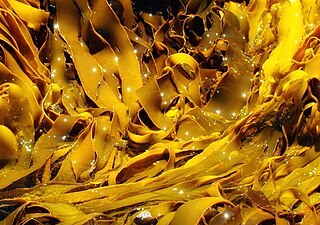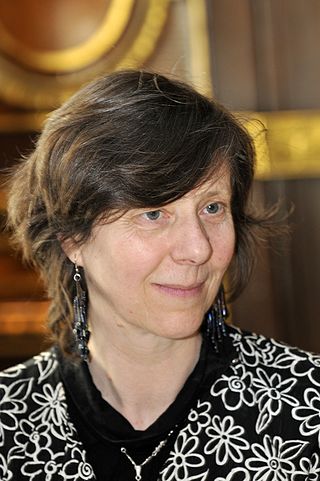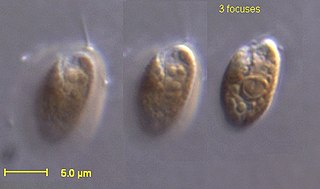
Phycology is the scientific study of algae. Also known as algology, phycology is a branch of life science.

The silicoflagellates are a small group of unicellular photosynthetic protists, or algae, belonging to the supergroup of eukaryotes known as Stramenopiles. They behave as plankton and are present in oceanic waters. They are well-known from harmful algal blooms that cause high mortality of fish. Additionally, they compose a rich fossil record represented by their silica skeletons.

AlgaeBase is a global species database of information on all groups of algae, both marine and freshwater, as well as sea-grass.
Schmitzia hiscockiana is a small, rare, red seaweed or marine alga of the phylum Rhodophyta or red algae. It was discovered and named in 1985.
The history of phycology is the history of the scientific study of algae. Human interest in plants as food goes back into the origins of the species, and knowledge of algae can be traced back more than two thousand years. However, only in the last three hundred years has that knowledge evolved into a rapidly developing science.
Allen Press was a printer and publisher of scientific, academic and scholarly journals as well as commercial trade publications. Founded by Harold Allen in 1935, the company was located in Lawrence, Kansas from its founding 1935 until October, 2023. Minnesota-based company, CJK Group purchased Allen Press in early 2023 and over a ten-month stretch, moved work from the Lawrence facility to other plants within the company, laid off over a hundred employees, and laid off over one hundred people in the name of slightly increasing their corporate bottom line.

Mandayam Osuri Parthasarathy Iyengar was a prominent Indian botanist and phycologist who researched the structure, cytology, reproduction and taxonomy of algae. He is known as the "father of Indian phycology" or "father of algology in India". He was the first President of Phycological Society of India. He primarily studied the Volvocales.
Grethe Berit Rytter Hasle was a Norwegian planktologist. Among the first female professors of natural science at the University of Oslo, she specialized in the study of phytoplankton.

Isabella Aiona Abbott was an educator, phycologist, and ethnobotanist from Hawaii. The first native Hawaiian woman to receive a PhD in science, she became a leading expert on Pacific marine algae.
The Phycological Society of America (PSA) is a professional society, founded in 1946, that is dedicated to the advancement of phycology, the study of algae. The PSA is responsible for the publication of Journal of Phycology and organizes annual conferences among other events that aid in the advancement of related algal sciences.
Michael Melkonian is a German botanist and professor of botany at the University of Cologne.

Gavino Trono Jr. is a Filipino marine biologist dubbed as the "Father of Kappaphycus farming". He was conferred the rank of National Scientist of the Philippines for contributions to the study of tropical marine phycology, focusing on seaweed biodiversity. He is currently a professor emeritus of the University of the Philippines Marine Science Institute.
Paul Claude Silva was a phycologist, marine biologist, and algal taxonomist considered to be the world's leading expert in the chlorophyte green algal genus Codium. Silva was also an expert in botanical nomenclature and was an editor of the International Code of Botanical Nomenclature's Eighth through Sixteenth International Botanical Congresses.
Jean Feldmann (1905–1978) was a French biologist, specialising in marine algae.

Christine Adair Maggs is a British phycologist. Formerly Executive Dean of the Faculty of Science & Technology at Bournemouth University, she was the first Chief Scientist of the Joint Nature Conservation Committee, retiring in 2022. She is now an independent non-executive Director of Ocean Harvest Technology https://oceanharvesttechnology.com/corporate-governance/board-of-directors/

Wendy Alison Nelson is a New Zealand marine scientist and world expert in phycology. She is New Zealand's leading authority on seaweeds. Nelson is particularly interested in the biosystematics of seaweeds/macroalgae of New Zealand, with research on floristics, evolution and phylogeny, as well as ecology, and life history studies of marine algae. Recently she has worked on the systematics and biology of red algae including coralline algae, distribution and diversity of seaweeds in harbours and soft sediment habitats, and seaweeds of the Ross Sea and Balleny Islands.

Michael Dominic Richard Guiry, is an Irish botanist, who specialises in phycology (algae). See for example the articles. He is the founder and director of the algal database, AlgaeBase.

Pyrenomonadaceae is a family of cryptomonads which includes three or four known genera. They are distinguished from other cryptomonads by their nucleomorphs being imbedded into the pyrenoid, and the presence of distinctive pigment phycoerythrin 545.
Greta Albrecht Fryxell was a marine scientist known for her work on the biology and taxonomy of diatoms. In 1996, she was elected a fellow of the American Association for the Advancement of Science.
Linda Karen Medlin is a molecular biologist known for her work on diatoms. She is an elected member of the Norwegian Academy of Science and Letters.









